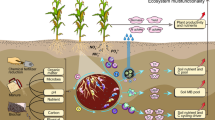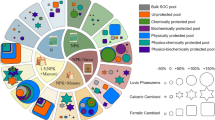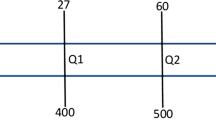Abstract
This study aimed to evaluate contrasting organic amendments as a strategy to promote the recovery of biotic and abiotic edaphic conditions central to the reestablishment of soil ecosystem functions at a site in south-central Chile affected by megafires in the 2016–2017 summer season. We analyzed the effects of the application of fresh (poultry and swine manure) and stabilized (compost of agricultural waste origin) organic amendments on microbial parameters, including basal respiration, microbial biomass, the carbon mineralization coefficient, and the microbial metabolic quotient, along with soil physicochemical properties related to soil fertility and stability. All organic amendments improved soil fertility and stimulated soil microbial activity. Fresh amendments, particularly swine manure, promoted the immediate recovery of the microbial conditions evaluated. However, greater mineralization rates and thus presumably shorter periods of carbon (C) source consumption were related to the application of such organic amendments. Soils treated with compost accumulated the most organic carbon and nitrogen, ensuring long-term nutrient release and thus long-term soil function recovery. Choosing the type of organic amendment to use to sustain ecosystem resilience will highly depend on the restoration goals over time.


Similar content being viewed by others
Data Availability
The datasets generated during and/or analyzed during the current study are available from the corresponding author on reasonable request.
Abbreviations
- CFU:
-
Colony-forming unit
- EC:
-
Electrical conductivity
- GLMs:
-
Generalized linear models
- qCO2:
-
Metabolic quotient
- OC:
-
Organic carbon
- PCA:
-
Principal component analysis
- SIR:
-
Substrate-induced respiration
References
Anderson JPE, Domsch KH (1978) A physiological method for the quantitative measurement of microbial biomass in soils. Soil Biol Biochem 10:215–221. https://doi.org/10.1016/0038-0717(78)90099-8
Anderson TH, Domsch KH (1990) Application of eco-physiological quotients (qCO2 and qD) on microbial biomasses from soils of different cropping histories. Soil Biol Biochem 22:251–255. https://doi.org/10.1016/0038-0717(90)90094-G
Bastida F, Torres IF, Hernández T, Bombach P, Richnow HH, García C (2013) Can the labile carbon contribute to carbon immobilization in semiarid soils? Priming effects and microbial community dynamics. Soil Biol Biochem 57:892–902. https://doi.org/10.1016/j.soilbio.2012.10.037
Bastida F, Zsolnay A, Hernández T, García C (2008) Past, present and future of soil quality indices: a biological perspective. Geoderma 147:159–171. https://doi.org/10.1016/j.geoderma.2008.08.007
Benito E, Díaz-Fierros F (1989) Estudio de los principales factores que intervienen en la estabilidad estructural de los suelos de Galicia. An Edafolgía y Agrobiol 48:229–253
Bernal MP, Alburquerque JA, Moral R (2009) Composting of animal manures and chemical criteria for compost maturity assessment. A review. Bioresour Technol 100:5444–5453. https://doi.org/10.1016/j.biortech.2008.11.027
Bremner JM, Mulvaney CS (1982) Nitrogen total. In: Page AL, Miller RH, Keeney DR (eds) Methods of soil analysis, part 2, Chemical and Microbiological Properties. American Society of Agronomy, Madison, pp 595–624
Brink RH, Dubach P, Lynch DL (1960) Measurement of carbohydrates in soil hydrolyzates with anthrone. Soil Sci 89:157–166
Burriel F, Hernando V (1950) El fósforo en los suelos españoles. Nuevo método para determinar el fósforo asimilable en los suelos. In: Anales de Edafología y Agrobiología. pp 611–622
Cellier A, Gauquelin T, Baldy V, Ballini C (2014) Effect of organic amendment on soil fertility and plant nutrients in a post-fire Mediterranean ecosystem. Plant Soil 376:211–228. https://doi.org/10.1007/s11104-013-1969-5
Corporación Nacional Forestal (CONAF) (2017) Número de incendios forestales y superficie afectada a la fecha. Ministerio de Agricultura, Santiago. Retieved from https://www.conaf.cl/incendios-forestales/incendios-forestales-en-chile/estadisticas-historicas/. on July 2019
Costantini EAC, Branquinho C, Nunes A, Schwilch G, Stavi I, Valdecantos A, Zucca C (2016) Soil indicators to assess the effectiveness of restoration strategies in dryland ecosystems. Solid Earth 7:397–414. https://doi.org/10.5194/se-7-397-2016
De la Barrera F, Barraza F, Favier P, Ruiz V, Quense J (2018) Megafires in Chile 2017: monitoring multiscale environmental impacts of burned ecosystems. Sci Total Environ 637:1526–1536. https://doi.org/10.1016/j.scitotenv.2018.05.119
Díez JA (1982) Consideraciones sobre la utilización de la técnica extractiva de Burriel y Hernando para la evaluación del P asimilable en suelos. An Edafol Agrobiol 41:1345–1352
Fernández JM, Plaza C, Hernández D, Polo A (2007) Carbon mineralization in an arid soil amended with thermally-dried and composted sewage sludges. Geoderma 137:497–503. https://doi.org/10.1016/j.geoderma.2006.10.013
Fuentes-Ramirez A, Barrientos M, Almonacid L, Arriagada-Escamilla C, Salas-Eljatib C (2018) Short-term response of soil microorganisms, nutrients and plant recovery in fire-affected Araucaria araucana forests. Appl Soil Ecol 131:99–106. https://doi.org/10.1016/j.apsoil.2018.08.010
García-Carmona M, Arcenegui V, García-Orenes F, Mataix-Solera J (2020) The role of mosses in soil stability, fertility and microbiology six years after a post-fire salvage logging management. J Environ Manag 262:110287. https://doi.org/10.1016/j.jenvman.2020.110287
Garreaud RD, Boisier JP, Rondanelli R, Montecinos A, Sepúlveda HH, Veloso-Aguila D (2020) The Central Chile mega drought (2010–2018): a climate dynamics perspective. Int J Climatol 40:421–439. https://doi.org/10.1002/joc.6219
Goberna M, García C, Insam H, Hernández MT, Verdú M (2012) Burning fire-prone Mediterranean shrublands: immediate changes in soil microbial community structure and ecosystem functions. Soil Microbiol 64:242–255. https://doi.org/10.1007/s00248-011-9995-4
González-Pérez JA, González-Vila FJ, Almendros G, Knicker H (2004) The effect of fire on soil organic matter - a review. Environ Int 30:855–870. https://doi.org/10.1016/j.envint.2004.02.003
González-Ubierna S, Jorge-Mardomingo I, Carrero-González B, Teresa de la Cruz M, Ángel Casermeiro M (2012) Soil organic matter evolution after the application of high doses of organic amendments in a Mediterranean calcareous soil. J Soils Sediments 12:1257–1268. https://doi.org/10.1007/s11368-012-0516-y
Guénon R, Gros R (2016) Soil microbial functions after forest fires affected by the compost quality. Land Degrad Dev 27:1391–1402. https://doi.org/10.1002/ldr.2393
Haynes RJ (2005) Labile organic matter fractions as central components of the quality of agricultural soils: an overview. Adv Agron 85:221–268
Heneghan L, Miller SP, Baer S, Callaham MA, Montgomery J, Pavao-Zuckerman M, Rhoades CC, Richardson S (2008) Integrating soil ecological knowledge into restoration management. Restor Ecol 16:608–617. https://doi.org/10.1111/j.1526-100X.2008.00477.x
Holden SR, Treseder KK (2013) A meta-analysis of soil microbial biomass responses to forest disturbances. Front Microbiol 4. https://doi.org/10.3389/fmicb.2013.00163
Hoover NL, Law JY, Long LAM, Kanwar RS, Soupir ML (2019) Long-term impact of poultry manure on crop yield, soil and water quality, and crop revenue. J Environ Manag 252:109582. https://doi.org/10.1016/j.jenvman.2019.109582
Hueso-González P, Muñoz-Rojas M, Martínez-Murillo JF (2018) The role of organic amendments in drylands restoration. Curr Opin Environ Sci Heal 5:1–6. https://doi.org/10.1016/j.coesh.2017.12.002
Kabata-Pendias A (2011) Trace elements in soils and plants, 4th edn. CRC, Boca Raton
Keeley JE (2009) Fire intensity, fire severity and burn severity: a brief review and suggested usage. Int J Wildl Fire 18:116–126. https://doi.org/10.1071/WF07049
Keesstra SD, Bouma J, Wallinga J, Tittonell P, Smith P, Cerdà A, Montanarella L, Quinton JN, Pachepsky Y, van der Putten WH, Bardgett RD, Moolenaar S, Mol G, Jansen B, Fresco LO (2016) The significance of soils and soil science towards realization of the United Nations Sustainable Development Goals. Soil 2:111–128. https://doi.org/10.5194/soil-2-111-2016
Kowaljow E, Mazzarino MJ (2007) Soil restoration in semiarid Patagonia: chemical and biological response to different compost quality. Soil Biol Biochem 39:1580–1588. https://doi.org/10.1016/j.soilbio.2007.01.008
Kuzyakov Y (2006) Sources of CO2 efflux from soil and review of partitioning methods. Soil Biol Biochem 38:425–448. https://doi.org/10.1016/j.soilbio.2005.08.020
Larchevêque M, Baldy V, Korboulewsky N, Ormeño E, Fernandez C (2005) Compost effect on bacterial and fungal colonization of kermes oak leaf litter in a terrestrial Mediterranean ecosystem. Appl Soil Ecol 30:79–89. https://doi.org/10.1016/j.apsoil.2005.02.010
Larney FJ, Angers DA (2012) The role of organic amendments in soil reclamation: a review. Can J Soil Sci 92:19–38. https://doi.org/10.4141/CJSS2010-064
Lê S, Josse J, Rennes A, Husson F (2008) FactoMineR: an R package for multivariate analysis. JSS J Stat Softw 25
Marín C, Rojas C (2020) Early responses of soil health indicators to organic amendments and plant establishment at a fire-affected sclerophyllous forest. Agro Sur 48:17–27. https://doi.org/10.4206/agrosur.2020.v48n2-03
Mengual C, Schoebitz M, Azcón R, Roldán A (2014) Microbial inoculants and organic amendment improves plant establishment and soil rehabilitation under semiarid conditions. J Environ Manag 134:1–7. https://doi.org/10.1016/j.jenvman.2014.01.008
Moreira F, Ascoli D, Safford H, Adams MA, Moreno JM, Pereira JM, Catry FX, Armesto J, Bond W, González ME, Curt T (2020) Wildfire management in Mediterranean-type regions: paradigm change needed. Environ Res Lett 15:011001. https://doi.org/10.1088/1748-9326/ab541e
Muñoz-Rojas M (2018) Soil quality indicators: critical tools in ecosystem restoration. Curr Opin Environ Sci Health 5:47–52. https://doi.org/10.1016/j.coesh.2018.04.007
Neary DG, Ryan KC, DeBano LF, Landsberg JD, Brown JK (2005) Chapter 1: Introduction. In: Neary DG, Ryan KC, DeBano LF (eds) Wildland fire in ecosystems: effects of fire on soils and water. Gen. Tech. Rep. RMRS-GTR-42-vol.4, Ogden. p 816
Nelson D, Sommers L (1983) Total carbon, organic carbon, and organic matter. In: Page AL (ed) Methods of soil analysis, part 2. Chemical and Biological Methods, p 816
Ojeda G, Alcañiz JM, Ortiz O (2003) Runoff and losses by erosion in soils amended with sewage sludge. Land Degrad Dev 14:563–573. https://doi.org/10.1002/ldr.580
Paul EA (2014) Soil microbiology, ecology, and biochemistry: an exciting present and great future built on basic knowledge and unifying concepts. Academic Press, Fort Collins
Pausas JG, Llovet J, Anselm R, Vallejo R (2009) Are wildfires a disaster in the Mediterranean basin ? – a review vegetation changes Shrublands dominated by resprouting species. Int J Wildl Fire 17:713–723. https://doi.org/10.1071/WF07151
Pérez-Valera E, Goberna M, Verdú M (2019) Fire modulates ecosystem functioning through the phylogenetic structure of soil bacterial communities. Soil Biol Biochem 129:80–89. https://doi.org/10.1016/j.soilbio.2018.11.007
Quevauviller P, Lachica M, Barahona E, Gomez A, Rauret G, Ure A, Muntau H (1998) Certified reference material for the quality control of EDTA- and DTPA-extractable trace metal contents in calcareous soil (CRM 600). Fresenius J Anal Chem 360:505–511. https://doi.org/10.1007/s002160050750
Rodríguez J, González-Pérez JA, Turmero A, Hernández M, Ball AS, González-Vila FJ, Arias ME (2018) Physico-chemical and microbial perturbations of Andalusian pine forest soils following a wildfire. Sci Total Environ 634:650–660. https://doi.org/10.1016/j.scitotenv.2018.04.028
Roldán A, García-Orenes F, Lax A (1994) An incubation experiment to determine factors involving aggregation changes in an arid soil receiving urban refuse. Soil Biol Biochem 26:1699–1707. https://doi.org/10.1016/0038-0717(94)90323-9
Ros M, Hernandez MT, García C (2003) Soil microbial activity after restoration of a semiarid soil by organic amendments. Soil Biol Biochem 35:463–469. https://doi.org/10.1016/S0038-0717(02)00298-5
RStudio Team (2020) RStudio: integrated development for R. RStudio, Inc., Boston URL http://www.rstudio.com/. http://www.rstudio.com/
Soil Survey Staff (2014) Keys to Soil Taxonomy. 12th ed
Tejada M, Gonzalez JL (2006) Crushed cotton gin compost on soil biological properties and rice yield. Eur J Agron 25:22–29. https://doi.org/10.1016/j.eja.2006.01.007
Acknowledgements
The authors acknowledge the Galvez family, who permitted site access and provided historical information, and Eduardo Arellano, Pilar Fuenzalida, and Camila Bustamante for the field and laboratory assistance.
Funding
This work was supported by the Fondo de Protección Ambiental (FPA) [Project No. 6-RE-002-2018 of the Ministry of Environment], the National Research and Development Agency (ANID) of Chile [CONICYT PIA/BASAL Project FB0002], the Spanish Ministry of Economy and Competitiveness [grant FPI-MINECO BES-2017-081283 supporting M.G.], and the University of O’Higgins [postdoctoral fellowship program founding 2018 for C.M.].
Author information
Authors and Affiliations
Corresponding author
Ethics declarations
Conflict of Interest
The authors declare no competing interests.
Additional information
Publisher’s note
Springer Nature remains neutral with regard to jurisdictional claims in published maps and institutional affiliations.
Supplementary Information
ESM 1
(DOCX 17 kb)
Rights and permissions
About this article
Cite this article
García-Carmona, M., Marín, C., García-Orenes, F. et al. Contrasting Organic Amendments Induce Different Short-Term Responses in Soil Abiotic and Biotic Properties in a Fire-Affected Native Mediterranean Forest in Chile. J Soil Sci Plant Nutr 21, 2105–2114 (2021). https://doi.org/10.1007/s42729-021-00506-z
Received:
Accepted:
Published:
Issue Date:
DOI: https://doi.org/10.1007/s42729-021-00506-z




